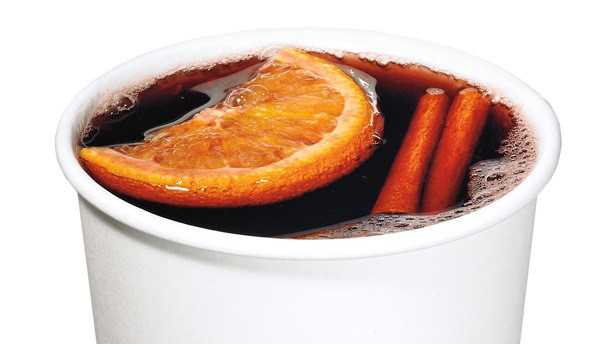LONDON, UK – Hot drinks sold in British coffee shops can contain a “shocking” amount of sugar – up to 25 teaspoons in one serving. That’s three times the amount of sugar in one can of Coca-Cola and over three times the maximum adult daily intake recommended by the American Heart Association.
Action for Sugar, which surveyed the UK’s high street coffee shops, found that 98 percent of hot flavoured drinks on sale would receive a warning sticker for excessive levels of sugar per serving, if sold pre-packaged.
Starbucks’s Hot Mulled Fruit Grape with Chai, Orange and Cinnamon (Venti) – in the picture above – was the worst offender, with 99g of sugar per serving, the equivalent of 25 teaspoons. A Costa Chai Latte, Massimo, Eat In has 79.7g of sugar, or 20 teaspoons per serving. A single McVitie’s Milk Chocolate Digestive, by comparison, contains 4.9g of sugar.
In response, Starbucks said that it was committed to reducing added sugar in its indulgent drinks by 35 percent by the end of 2020.
The maximum recommended intake of free sugars (those not in milk products or whole fruit and vegetables) is seven teaspoons for an adult.
The campaign group surveyed 131 drinks in total and found that 55 percent contained the equivalent of, or more than, this limit.
In total, 35 percent of the hot drinks surveyed contained the same amount or more sugars than a can of Coca Cola, which contains nine teaspoons per can.
Calling the findings “shocking”, a spokesman for the charity said that 98 per cent of the drinks tested would receive a red nutritional-value label for high-sugar content.
Action on Sugar’s chair, Professor Graham MacGregor, said it was “another example of the scandalous amount of sugar added to our food and drink – no wonder we have the highest rates of obesity in Europe”.
“These hot flavored drinks should be an occasional treat, not an ‘everyday’ drink. They are laden with an unbelievable amount sugar and calories and are often accompanied by a high-sugar and [high-]fat snack.
It is not surprising that we have the highest rate of obesity in Europe.
Our advice to consumers is to have a plain hot drink or ask for your drink to contain a minimal amount of syrup, preferably sugar-free, in the smallest serving size available,” said Kawther Hashem, a registered nutritionist and researcher for Action on Sugar.
“These results highlight the need for more transparency on sugar content and compulsory labeling of sugar content. Drinkers deserve to know how much sugar they are consuming,” said Nicola Close, chief executive of the Association of Directors of Public Health.
The World Health Organization recently suggested cutting the recommended sugar intake for adults in half, to about 25 grams, as health campaigns have increasingly scrutinized excessive sugar contents.


















